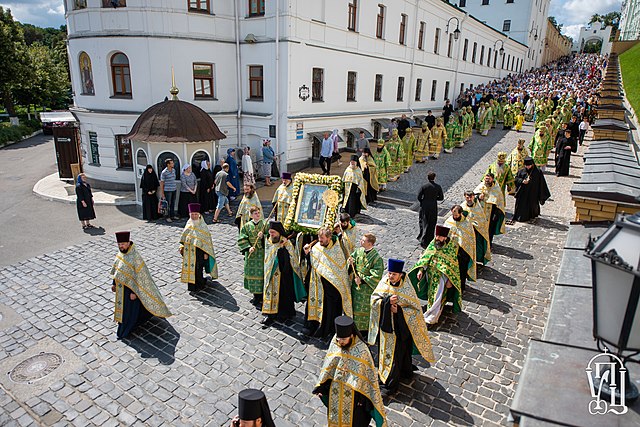
Creative Commons / Public domain
Today’s hymn from Sing Praise is a setting of Psalm 122 (121 in the Catholic numbering) by Bernadette Farrell, “I rejoiced when I heard them say”. What did they say? “Let us go to the house of our God”. This text, an obvious choice for a church dedication, religious procession or other celebration, has been set by various composers as a choir anthem, but Farrell’s version is a metrical setting of the psalm, presumably intended for congregational singing. The five verses are a close rendering of original (at least, very similar to other prose translations) with (as John will no doubt point out) no attempt at rhyming.
The chorus is not taken from the psalm but takes the phrase “Pray for the peace of Jerusalem” in verse 6 of the psalm (rendered more inclusively in verse 4 of the hymns as “For the peace of all nations, pray”) and uses the Hebrew word ‘shalom’ for ‘peace’, so we get “Shalom, shalom, the peace of God be here. Shalom, shalom, God’s justice be ever near”. Justice is one of Bernadette Farrell’s recurring themes.
The hymn would therefore be suitable, not only for a festival, but also for any act of worship where God’s peace and justice are a focus.
Yes, as Stephen predicts: no rhymes!
I think Bernadette Farrell has a lovely way of writing words which seem to flow with ease, and this hymn (or song?) is easy to pick up and sing through. I think sometimes this comes at the expense of the plain meaning of the text, and I wasn’t completely convinced that I had expressed what the Psalm actually said by the time I had got to the end of it.
I think Psalm 122 functions as a kind of manifesto for Jerusalem. It is to be a special place for three things:
* it is a city with a single focus on the LORD, and the phrase “closely compacted together” means that not only are the buildings squashed together, united in space, but that they are united in purpose of glorifying God too;
* it is a city for uniting the diverse tribes of Israel, and as such isn’t the preserve of any one tribe but rather a place of equality in worship and service of God, and a place for peace between people; and
* it is a city for impartial justice, where complaints can be heard properly and everyone has the right to a fair trial (this is why the cry “to your tents O Israel” (1 Kings 12:16) is such a devastating turning point in the land, as the northern tribes no longer believed they would get a fair hearing in the LORD’s city.
In other words, Jerusalem is supposed to be the same kind of place as Geneva was for uniting the nations. And somehow, although Bernadette had many of these words, I didn’t really get that threefold purpose from her lyrics.
Where I was least satisfied with this hymn was in the chord structure that underlay it and the way the stanzas ended. I wanted the verse to end by rising to the C, and to finish with a C chord rather than a return to the A-minor; and I wanted a Tierce-de-Picardie at the end of the chorus (so that the last chord becomes A-major with a C# in the chord). And I also wanted a C chord in bar 6 of the verse (the word “standing” in v1) (and I think I played this chord when I sang the piece). To me the tune became slightly a prisoner of its resolute minor overtones, whereas the Psalm as a whole is more joyful than sad.